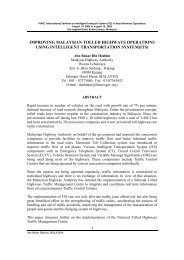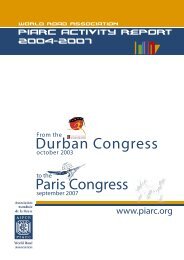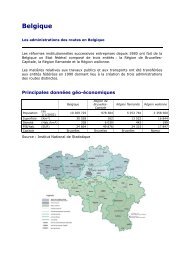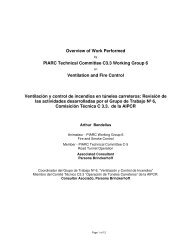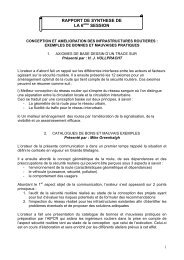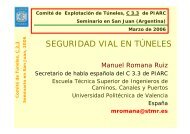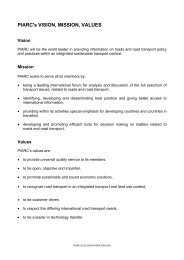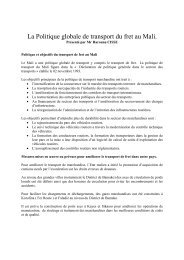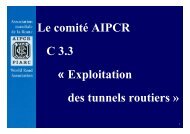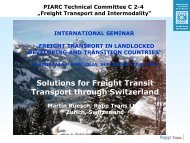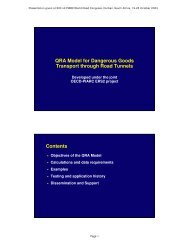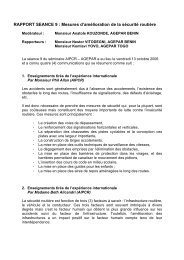General proceedings - Association mondiale de la Route
General proceedings - Association mondiale de la Route
General proceedings - Association mondiale de la Route
Create successful ePaper yourself
Turn your PDF publications into a flip-book with our unique Google optimized e-Paper software.
Highlights of the presentation:<br />
• Road tolling was introduced to bring in finances from the private sector when there were<br />
Government budgetary constraints.<br />
• Shadow tolling was not sustainable because the toll prices consi<strong>de</strong>red only savings in<br />
time and fuel.<br />
• In South Africa, experience showed that to have a fully pledged concession toll road for<br />
30 years, 4,000 vehicles per day minimum was required.<br />
• Political support and commitment are key to successful toll roads.<br />
• Maputo toll road was the first of the 3 rd generation of toll roads and has been operating<br />
successfully since 1997.<br />
• Heavy trucks pay more in road toll than lighter trucks.<br />
• Overloading <strong>de</strong>creased by 20% un<strong>de</strong>r private sector involvement in road tolls.<br />
• The first 5 to 8 years of any toll road are risky and progress is normally slow.<br />
Title: Road Tolls and Road Pricing: Innovative Methods to Charge for the Use of<br />
Road Systems<br />
Author & Presenter: Daphnée Benayoun (pictured), Project Engineer/ Transport<br />
Economist, Louis Berger SAS, France<br />
The presentation was on innovative methods to charge<br />
road users as alternatives to the common source of fuel<br />
taxes, which it is noted, will not to be sufficient to cope<br />
with the growing needs in the long run. Apart from<br />
trying to get revenue to meet the costs of <strong>de</strong>veloping<br />
and maintaining roads, other challenges have emerged<br />
that greatly affect the roads sub-sector such as<br />
congestion, road safety and environmental issues. To<br />
tackle these challenges together with the issue of<br />
meeting <strong>de</strong>velopment and maintenance financial needs for roads, many countries have<br />
resorted to using public private partnerships for toll roads or direct user charging systems.<br />
The presenter focused on three types of road user charging that are Electronic toll collection<br />
systems, Managed <strong>la</strong>nes and mileage based user charges and Urban tolls. Examples from<br />
around the world were presented including the congestion charging system in central<br />
London, Stockholm, and Singapore that have reduced congestion and optimised transport<br />
<strong>de</strong>mand.<br />
Highlights of the presentation:<br />
• Taxes from fuel are not sufficient to cope with the financial <strong>de</strong>mands for <strong>de</strong>velopment<br />
and maintenance of roads.<br />
• Direct road user charging is an alternative to fuel taxes to meet financial needs for the<br />
roads.<br />
• Other challenges have emerged such as congestion, road safety and environmental issues<br />
whose mitigation measures carry a cost.<br />
• Introduction of congestion charges to reduce traffic should be coupled with provision of<br />
a<strong>de</strong>quate public transport for commuters.<br />
41



